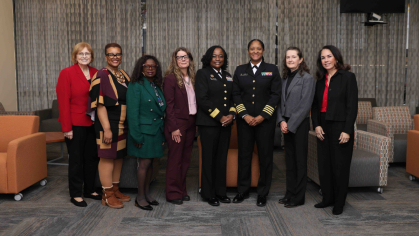Lauren Snedeker is an Assistant Professor of Teaching & Director of the Certificate on Aging & Health at Rutgers School of Social Work. We had the chance to speak with her about Older Americans Month and how social workers can support older individuals this month and well beyond.
Tell us a bit about your journey to social work.
My journey to social work is one that I am proud to share, especially as I celebrate my fifth year at Rutgers and as the Director of the Aging and Health Certificate Program.
I had always imagined working in healthcare and received my undergraduate degree in Public Health from Rutgers. During my undergraduate experience, I started a student club called The Public Health Initiative, which aimed to participate in community-based events promoting health and wellness. I remember fondly spending each Halloween at a New Brunswick-based trunk-or-treat event, handing out healthy snacks and dental hygiene kits for kids and their families. From there, I moved forward in an administrative role at Memorial Sloan Kettering (MSK) Cancer Center. For five years, I assisted physicians at MSK with managing their clinics and provided support to their patients. Serendipitously, I was assigned to work with a physician who only saw older women living with cancer. It was then and there that I recognized the need for more specialized approaches for working with older people in healthcare that was safe and inclusive. I completed my master of social work (MSW) degree at the Silver School of Social Work at New York University. My first practicum assignment was at a vibrant senior center in midtown Manhattan, and my second was in a very underfunded long-term care facility in the Bronx, New York. Both were inspiring and provided me with a comprehensive understanding of how people age and what impacts that experience. Now, I enjoy the opportunity to educate students based on theory, research, and my own direct practice experiences in working with older adults.
What is the significance of Older Americans Month for you?
This year’s theme for Older Americans Month is “Flip the Script on Aging.” Coincidentally, I feel that this theme relates well to my own professional mission. In the courses I teach, I not only focus on educating students on how to do social work. I also focus on educating students on age-inclusivity and the detrimental impacts of ageism. I include contemporary research that focuses on innovative ways to think about getting older, and each semester it is a joy to flip the script. I always approach this work with a genuine interest in debunking myths and dominant narratives that are not inclusive or realistic. To me, Older Americans Month, especially now, is a reminder to keep going so that we can all age the way we want to and deserve to.
How can the social work community recognize and commemorate Older Americans Month?
At Rutgers School of Social Work, the Hub for Aging Collaboration has supported numerous internally hosted and externally hosted events to raise awareness and honor Older Americans Month. I think the social work community at large can consider ways to incorporate learning about practice and policy affecting older adults through trainings, supervision, and continuing education opportunities. At Rutgers School of Social Work, our Continuing Education Department offers several post-graduate certificates focused on an aspect of practice with older people.
Another idea to consider for now and the future is thinking about getting involved to impact messaging about aging from one’s own location. Get curious about bringing in resources to your places and spaces to ensure age-inclusivity.
Now more than ever, we need to consider ways we can ACT and support all to live long and healthy lives.
This story was created in partnership with Rutgers School of Social Work's Inclusion, Intersectionality, Diversity, Equity, and Advancement (IIDEA) Committee.



